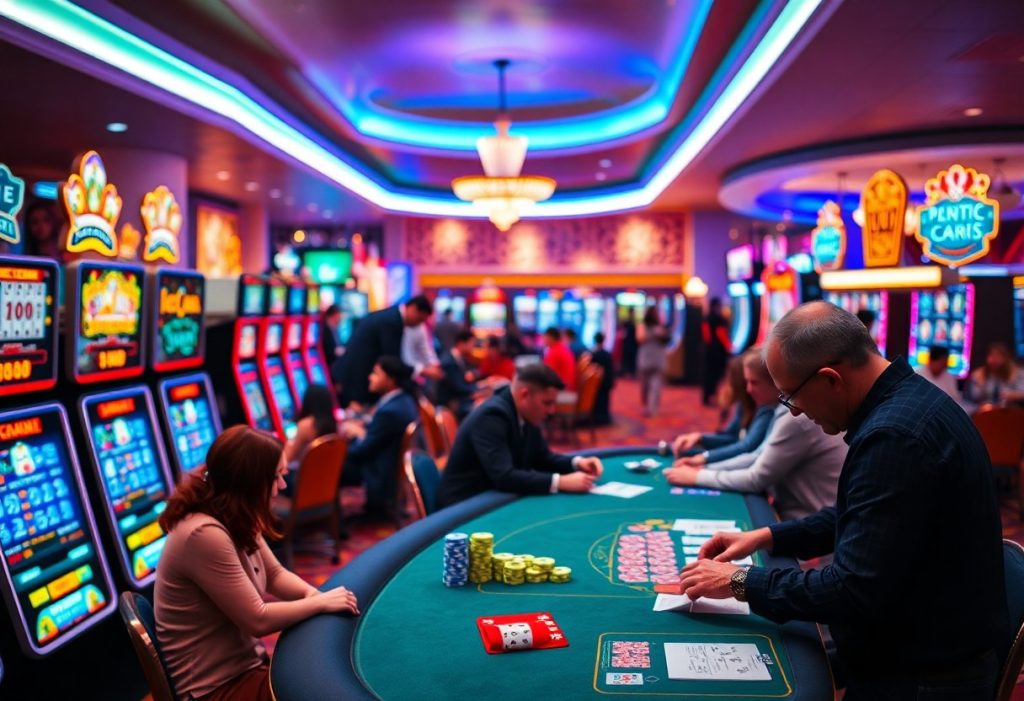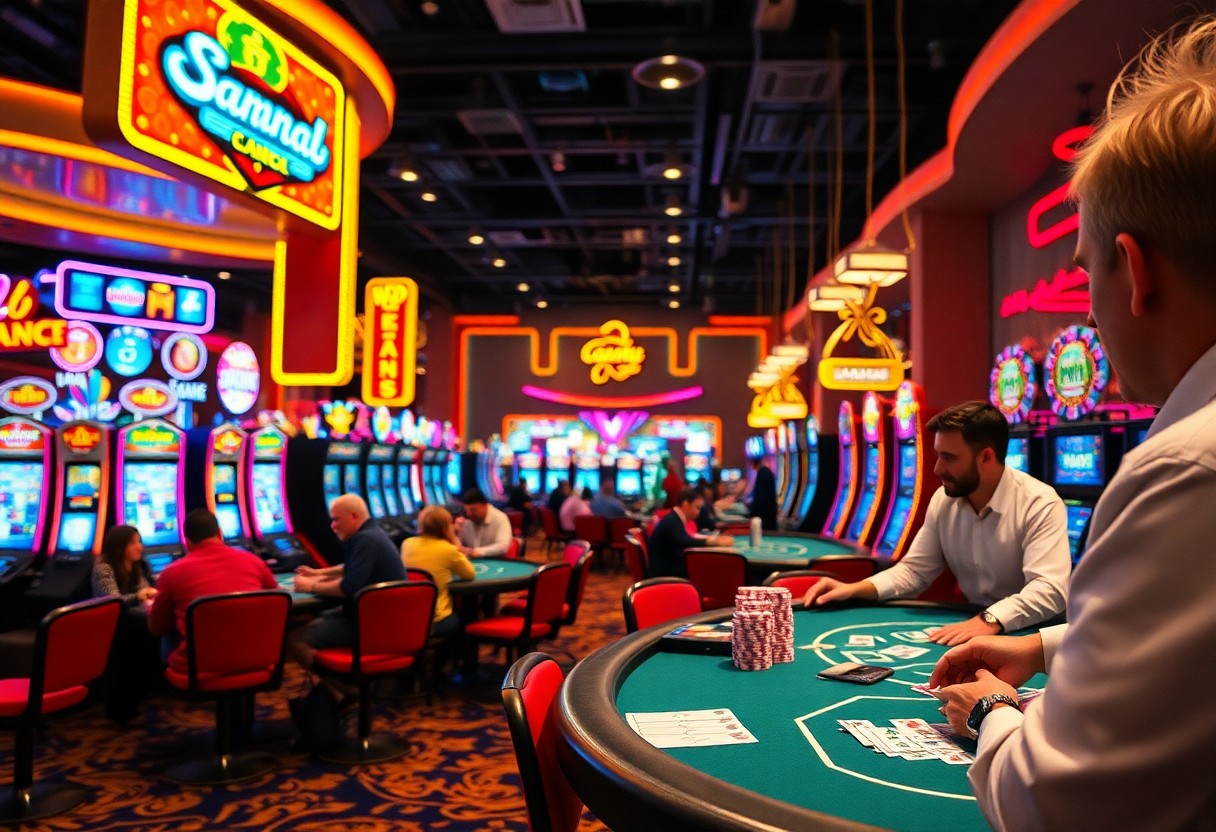
Many people are drawn to the allure of casino gambling, captivated by the excitement and potential for big wins. However, it’s imperative to understand the psychological factors at play, as they can lead to both positive experiences and serious dangers. As you navigate the world of gambling, you may be influenced by behavioral triggers, emotional states, and the powerful role of risk-taking. By delving into the psychology behind casino gambling, you can gain insights into your own motivations and the effects of your decisions.
The Appeal of Casino Gambling
Your inclination towards casino gambling may stem from its unique allure that intertwines risk, reward, and social interaction. The bright lights, the sound of spinning wheels, and the palpable energy create a captivating atmosphere, drawing you into a world where fortunes can change in an instant. This multifaceted experience not only satisfies your urge for excitement but also offers an engaging social environment where you can connect with others who share your passion for the thrill of the game.
Thrill and Excitement
Thrill seekers like you are often drawn to the adrenaline rush that casino gambling offers. The unpredictability of games such as blackjack, roulette, or slots can send your heart racing as you place your bets, waiting for the outcome that could dramatically alter your evening – or even your life. This sense of urgency and excitement creates a captivating experience, making every spin and shuffle feel like an opportunity for adventure.
Escape and Entertainment
An ever-present desire for escapism can lead you to the vibrant world of casino gambling. Many individuals turn to casinos as a form of entertainment, allowing them to momentarily step away from daily stressors and immerse themselves in a playful environment. This escape offers a chance to unwind and indulge in a little excitement, but it can also invite risks.
But while the allure of a casino can provide a much-needed break from reality, it’s vital to approach it with caution. The combination of potential winnings and engaging entertainment may mask the risk of financial loss and the danger of addiction. Understanding that gambling may mask other underlying issues, you should always remain conscious of your limits and ensure that your decision to engage is a healthy form of fun rather than a dangerous escape. By being mindful of these important factors, enjoy the thrill responsibly while keeping your well-being at the forefront.
Psychological Mechanisms Behind Gambling
Any exploration of casino gambling must probe into the psychological mechanisms that keep players engaged. Your brain is wired to respond to the thrill of uncertainty and the allure of potential rewards, making gambling an enticing activity. Understanding these mechanisms helps clarify why you may feel drawn to gamble time and again, even when the odds aren’t in your favor.
Reward Systems in the Brain
Behind the excitement of gambling lies a complex network of reward systems in your brain. These systems release chemicals like dopamine when you win, creating feelings of pleasure and reinforcing your behavior. The anticipation of winning activates these pathways as well, elevating the overall experience of gambling and making it hard to resist.
Cognitive Biases and Illusions
Systems of cognitive biases and illusions often cloud your judgment while gambling. You may overestimate your chances of winning or believe luck is on your side, which can lead to harmful betting behaviors. In fact, these illusions of control and cognitive distortions can make you develop an unrealistic perception about your outcomes, pushing you to gamble more than intended.
Illusions play a significant role in your gambling experience, distorting reality and shaping your decisions. You might fall prey to the gambler’s fallacy, thinking that a losing streak means a win is overdue, prompting you to chase losses. Additionally, near misses can provide a false sense of achievement, convincing you that winning is just around the corner. These biases can be dangerous, as they lead to continuous play and potentially escalating losses, creating a cycle that is hard to break.
The Role of Emotions in Gambling Behavior
The interplay of emotions significantly shapes your gambling experiences. When you engage in casino games, your feelings can drive your decisions, impacting both your enjoyment and potential losses. Strong emotions like excitement, fear, and frustration can alter your judgment, encouraging behaviors ranging from cautious play to impulsive bets. Awareness of these emotional influences can help you maintain control over your gambling choices.
Risk-Taking and Emotional Responses
Behind every gamble lies a spectrum of emotions that can influence your willingness to take risks. Fear of loss might make you hesitant, while the thrill of potential winnings could spur you to make bolder bets. This emotional response often leads to a rollercoaster of outcomes, affecting your overall gambling strategy and financial wellbeing.
The Impact of Mood on Gambling Choices
On a given day, your mood can play a significant role in shaping your gambling decisions. If you’re feeling happy, for instance, you might be more inclined to take higher risks, whereas feelings of sadness or frustration could lead to more conservative play. Studies have shown that positive moods can enhance your perception of winning probabilities, making it easier for you to overlook potential pitfalls.
Impact on your gambling choices can be profound. When in a positive mood, you might gravitate toward games with higher stakes, mistaking your euphoria for a guaranteed winning streak. On the other hand, a negative mood may push you to seek out quick wins, leading to dangerous impulsive decisions. Understanding how your emotional state affects your choices can empower you to gamble more responsibly, helping you recognize when it’s best to walk away or take a break.
Gambling Addiction and Its Consequences
Unlike many forms of entertainment, gambling can become a dangerous addiction that alters your life significantly. This addiction may lead to severe financial difficulties, strained relationships, and neglect of personal responsibilities. You might find yourself chasing losses, leading to a vicious cycle that further entrenches you in the habit. Understanding the consequences of gambling addiction is crucial for recognizing when it is time to seek help.
Recognizing Problem Gambling
Among the signs of problem gambling are preoccupation with gambling, increasing amounts wagered to achieve the same excitement, and irritability when trying to cut back. You may also notice that gambling becomes a way to escape personal issues, which can signal a developing issue. By acknowledging these behaviors, you can take the first step toward addressing your gambling habits.
Psychological and Social Impacts
Before delving deeper into gambling addiction, it’s important to understand the psychological and social impacts it can have on your life. The addiction may lead to feelings of isolation, anxiety, and depression, as well as strained relationships with family and friends. As you lose touch with loved ones, the emotional toll can intensify your dependence on gambling.
Consequences of gambling addiction extend far beyond financial loss. You may experience a significant decline in mental health, facing feelings of guilt, shame, and hopelessness. The social impacts are equally alarming; alienation from friends and family can lead to a profound feeling of isolation. In some cases, individuals may engage in unethical behavior such as theft or fraud to fuel their addiction. It’s crucial to recognize these dangers and understand that help is available, paving the way towards recovery.
Responsible Gambling Practices
Keep your gambling experience enjoyable and safe by adopting responsible practices. Set limits on your time and budget before playing, and stick to them to prevent overspending. Avoid using gambling as a means to escape stress or enhance your mood, as this can lead to unhealthy habits. Always keep your gambling activities fun, ensuring they don’t interfere with your personal or financial responsibilities.
Tools for Safe Gambling
Above all, utilizing tools for safe gambling can help you maintain control over your gaming habits. Many casinos offer options like self-exclusion programs, spending limits, and reminders that alert you when you exceed your set limits. These tools provide crucial support to help you enjoy gambling without jeopardizing your well-being.
Support Systems and Resources
Behind every responsible gambler is a network of support systems and resources. Connecting with professionals and support groups can enhance your understanding of gambling behavior and provide valuable guidance. You can reach out to helplines, local counseling services, and online forums that specialize in gambling issues to share experiences and gain insights.
Due to the potential risks associated with gambling, it’s crucial to tap into support systems and resources designed to help you navigate challenges. These include helplines, local counseling services, and online support groups specifically focused on gambling addiction. Engaging with professionals and supportive peers can empower you to understand your habits, receive expert advice, and find ways to safely enjoy gaming. The importance of community in fostering accountability and clarity cannot be underestimated in maintaining a healthy balance between entertainment and responsibility in your gambling activities.

Future Trends in Gambling Psychology
Not only is the landscape of gambling constantly changing, but the psychology that underpins it is also evolving. As newer generations engage with gambling, understanding how psychological factors influence behaviors is key to anticipating future trends. As a gambler, being aware of these changes can help you make informed choices and navigate the risks associated with your gambling experiences.
Technological Advances and Gambling Habits
Psychology plays a significant role in shaping gambling habits, especially with the advent of new technology. Mobile applications and virtual reality environments have shifted the way you engage with gaming experiences, potentially leading to more frequent play. As these technologies develop, understanding how they affect your emotions and decision-making processes becomes increasingly important for managing your gambling behavior.
Evolving Understanding of Gambling Behavior
Behind the scenes, experts are gaining a deeper understanding of gambling behavior, focusing on the social, emotional, and cognitive aspects that drive your decisions. For instance, studies have shown that social interactions in online gambling can strengthen a sense of community, leading to increased involvement. Additionally, cognitive biases, such as the illusion of control, may make you feel more in command of your outcomes than reality suggests. Recognizing these factors can empower you to make more informed choices and develop healthier gambling habits.
Conclusion
With these considerations, understanding the psychology of casino gambling can significantly enhance your approach to gaming. By recognizing the cognitive biases, emotional triggers, and social influences at play, you can make more informed decisions that align with your personal goals and desires. Your awareness of these psychological factors may help you enjoy the experience responsibly, ensuring that your time at the casino remains entertaining rather than detrimental.


